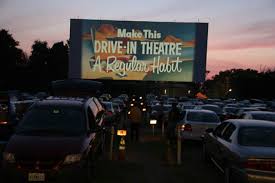美國版塊
Lexington
列克星頓專欄
Mid-century modern
中世紀現代主義
Americans should stop harking back to the 1950s. Many of the decade’s delights are still available
美國人應該停止回想上世紀50年代。那個十年期中的許多樂趣仍然存在。
The giant movie screen at Bengies was illuminated by a thrilling golden sunset when the cinema’s owner and compere, D. Edward Vogel, began reciting the house rules one recent Friday evening. It was dark before he had finished.
在最近的一個星期五的晚上,驚心動魄的金色夕陽照亮了Bengies的巨型電影屏幕,電影院的老板兼報幕員開始列舉觀影規則。他還沒說完就天黑了。

Bengies, a drive-in outside Baltimore, does not allow alcohol, profanity, car-horns or headlights—which seemed reasonable. It also bans barefoot children (even when carried), photography, vehicles left unoccupied without an explanatory note, and refunds or ticket changes of any kind, which seemed a bit over the top. “This is not an exclusive list of our rules, but it’s a pretty good start,” said Mr Vogel, as the sky darkened over the 120-foot-long movie screen. He still hadn’t got through his covid-19 stipulations.
Bengies是一家汽車影院,坐落于巴爾的摩,在這里禁止飲酒、謾罵、按汽車喇叭或打開頭燈,這些規則都很合理。但這里還禁止兒童赤腳(即使拿著鞋)、拍照、未經說明而擅自離車以及任何形式的退票或換票,這樣的規則似乎有點夸張了。當120英尺長的電影銀幕上的天空一片漆黑時,沃格爾先生說:“這并不是我們的專屬規則,但這是一個相當好的開始。”。他仍沒有講完針對新冠肺炎的規定。
Mr Vogel, whose uncle started Bengies in 1956, says its rules are necessary because many of his patrons are new to drive-ins (of 4,000 fresh-air theatres in 1958, fewer than 400 remain).But this was not true of the families setting out chairs and speakers around Lexington and his tribe. From Pennsylvania, Virginia and far-flung Maryland, they were Bengies habitués. They came for its giant screen, grandiose playing of the anthem and unreconstructed snack bar selling Bengies cola, foot-long hot dogs and much more. They revelled in its eccentricity. The drive-in is named after a 19th century president, Benjamin Harrison, and known for the snarky messages on its neon billboard. Best of all they loved the juxtaposition of electronic entertainment and hot night air.
沃格爾先生的叔叔在1956年創辦了Bengies,沃格爾表示這些規定很有必要,因為其中有許多顧客都是新來汽車影院的(1958年有4000家露天影院,現在只剩下不到400家)。但是,對于那些在列克星敦的專欄作家這群人的周圍擺設椅子和揚聲器的家庭們來說,并非如此。這些人來自賓夕法尼亞、弗吉尼亞以及遙遠的馬里蘭州,他們是Bengies的常客。他們來到Bengies汽車影院是為了這里的大屏幕、宏偉的電影奏樂以及販賣Bengies可樂、一英尺長的熱狗等許多美食的那家未改裝的小吃店。他們沉迷于這家影院的古怪。這家汽車影院以一位19世紀的總統本杰明·哈里森的名字命名,以霓虹燈廣告牌上的尖銳信息而聞名。他們最熱愛這里并存的電子娛樂以及夜間熱空氣。
These virtues were also apparent to first-timers. Like time-travelling Michael J. Foxes, your columnist and his family found the drive-in at once novel and deeply familiar. The experience has been depicted in a thousand films. More acutely, the same combination of mid-century technology, bossiness and cheesy familymindedness is still remarkably common. America is suffused with the culture of the 1950s. The pandemic, which has inspired pop-up drive-ins around the country, has made this even more evident.
對于第一次接觸的人來說,這些優點顯而易見。就像時光穿梭的邁克爾·J·福克斯一樣,專欄作家和他的家人都會立刻發現汽車影院既新奇又熟悉。有上千部電影中描述過這段經歷。專欄作家深刻地意識到,中世紀的科技、專橫和庸俗的家庭觀念仍然十分普遍。美國充斥著20世紀50年代的文化。這場疫情激化了全國各地的快閃汽車影院產業,也使這一點愈發明顯。
譯文由可可原創,僅供學習交流使用,未經許可請勿轉載。












